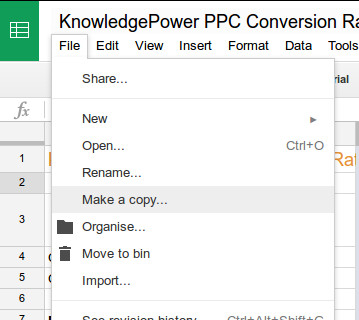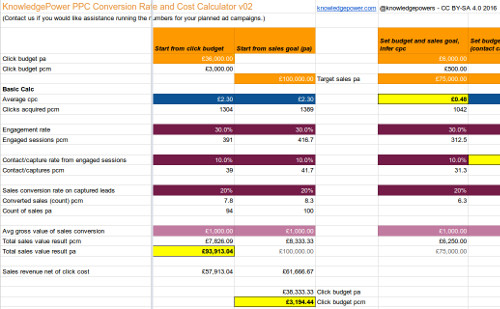Basic Rules of Thumb

Budgeting realistically for pay-per-click advertising is almost as simple as deciding how many clicks you need, and the average cost per click.
The word "realistic" is important, because the cost of clicks is largely determined by the popularity and competitiveness of the market you are advertising in. This means no amount of optimization or wishful planning will make your costs very much lower than the market-established levels.
Calculating cost per click - you will need to conduct some research campaigns to measure this, because it can vary a lot. If you have no idea, a simple rule of thumb for UK-focused businesses is that any B2C theme paid search clicks will cost at least £1.50 unless rather niche, and B2B paid search clicks at least £2.00. Average click costs can easily be £3-5 for competitive markets. Clicks typically cost a quarter as much in the Display network.
Deciding how many clicks you need. - Generally speaking, identify some actions you want people to take (such as contact captures) and work backwards from there. Don't plan budgets based on impossibly excellent conversion rates. Most businesses without previous metrics to go on will make unrealistically optimistic predictions about how responsive website visitors will be. Start with an action rate of 1% if you are not sure.
CPC Calculator
Use our Google Sheets calculator to run different hypothetical figures. For example, write up optimistic vs pessimistic assumptions and set targets for the KPIs.


In the spreadsheet, orange fields indicate settings to input, and yellow fields indicate results. Variable conversion rates are coloured purple, and cost per click is blue. If you currently have no idea of your likely cost per click then you can try conversion targets through column E to arrive at a target cost per click. If it comes out below £1 then your conversion targets are not realistic.
Example click budgets
First, a caveat: the only way to budget sanely is using actual figures for your own business, i.e. a unique combination of your business goals and market scope. You should conduct controlled experiments to establish valid figures for your business. The main idea of the figures below is to establish expectations that you generally won't be spending less than this!
All of the budgets are stated per calendar month and the advantage of PPC is that you do not have to commit for long time periods. Deciding if a campaign is working or not is easier the more budget is applied: because that means more impressions and clicks, and therefore more data. Conversely, lower-budget campaigns getting fewer clicks per day take longer to acquire enough data to judge performance.
- Local geographic scope, niche B2C: £600 pcm per location
- Local geographic scope, mainstream B2C: £1,200 pcm per location
- National (UK) campaign excluding London, niche B2C: £2,000 pcm (you go more niche than in your local campaign)
- National (UK) campaign excluding London, B2C: £4,000 pcm
- National (UK) + London, niche B2C: £4,000 pcm
- National (UK) + London, B2C: £8,000 pcm
- Local geographic scope, niche B2B: £1,000 pcm per location
- Local geographic scope, mainstream B2B: £2,000 pcm per location
- National (UK) campaign excluding London, niche B2B: £3,000 pcm
- National (UK) campaign excluding London, B2B: £6,000 pcm
- National (UK) + London, niche B2B: £6,000 pcm
- National (UK) + London, B2B: £12,000 pcm
- International: hard to make a general rule but if it is something like "the whole English-speaking world" then take the above figures and 10x for starters.
- None of the above figures are remotely useful if your target market is highly competitive in PPC: if you are not sure if that applies to you, run some limited test campaigns and you will soon find out the click cost level
- The choice of Search and/or Display generally affects the use of your click budget, rather than the total budget itself. In other words it is usually OK to plan PPC budgets without having to plan ahead about your exact mix of tactics and targeting. The main issue as you can see is how niche your market is, and what geographic radius you are advertising to.
Click budgets represent what you pay directly to Google (or any other PPC network). (Therefore these figures do not constitute all-inclusive campaign quotations from ourselves.)
When comparing different advertising campaigns, and different traffic channels generally, we recommend comparing cost per engaged session rather than cost per click.
PPC too expensive?
Need to test out whether AdWords is worth it? Consider a fixed cost PPC Research Project.
Running your PPC in house is perfectly logical if your click budget does not justify specialist management of your campaigns. If you are assigning internal team members to manage AdWords, or as an entrepreneurial manager doing it by yourself, you may be interested in our AdWords training
What other costs are involved in PPC?
Good question: your click costs are the main part, but you also need to plan for the supporting marketing resources to put it all together.
The main long-term cost consideration will be the human resources for managing campaigns. PPC should absolutely not be done on a "set and forget" basis. On any reasonable minimum click budget you will have significant work on a weekly basis, and the work involved expands if your organization expects campaigns to be reported on and discussed regularly. Frequent changes of tactic, or addition of short-term promotions, will also increase the amount of human work involved. Finally, Display campaigns over the long term involve more work because there are more targeting dimensions to test, including graphic ad design.
List of resource/cost considerations for ongoing PPC marketing:
- Staff or agency fees to design and manage campaigns
- Creation, publishing, and ongoing editing of landing pages
- Research and content writing for more sales-oriented landing pages
- Media for landing pages such as photos, infographics, and video
- Developer resources to implement technical requirements such as custom templates, forms, checkouts, popups, and analytics tracking
- Special creative/content projects to offer value to website visitors, e.g. white paper, resource guide, how-to videos
- Direct promotional costs, e.g. vouchers, discounts, freebies
- Any special software you expect to implement
- Resources related to reporting, testing, discussions (because you expect to keep your PPC work in context of your evolving overall marketing strategy and management)
Get A Quote for AdWords Campaign Management
Contact George at KnowledgePower:
[email protected] - 02392 809717
About KnowledgePower - Contact now

PPC Strategy
Image credits
Vector icons made by Vectorgraphit from www.flaticon.com is licensed by CC 3.0 BY
